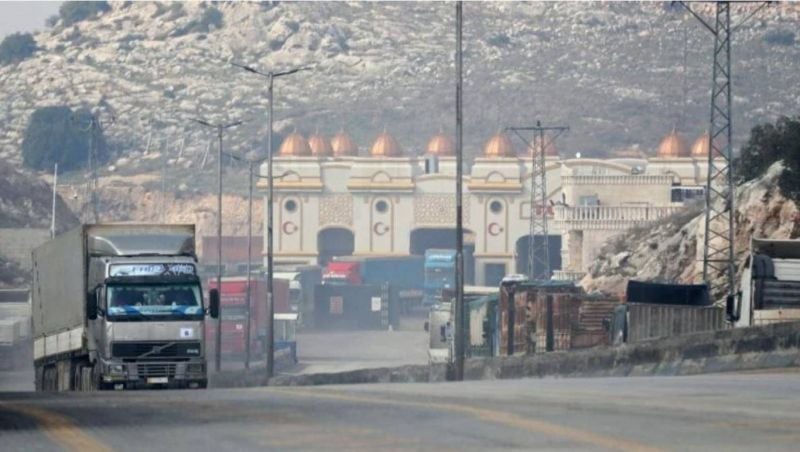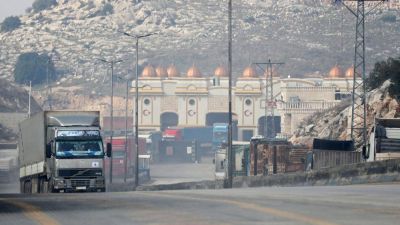
A convoy carrying humanitarian aid entering Syria from Turkey through the Bab al-Hawa border post on Jan. 18, 2022. AFP file photo
Moscow eventually got its way at the Security Council.
Russia on Friday vetoed a UN resolution drafted by Norway and Ireland on extending cross-border aid to the Idlib area in northwest Syria through the Bab al-Hawa border crossing.
Russia opted for a resolution providing for a six-month extension of humanitarian aid on Tuesday, which obtained 12 out of 15 votes, with Washington, London and Paris abstaining from voting to mark their opposition.
The authorization of the aid deliveries benefiting nearly 2.4 million Syrians living in the opposition-held area — half of whom are displaced persons — expired on July 10.
“Russia forced everyone’s hand: either the system would be ended, or it was extended for six months,” an ambassador told AFP, requesting anonymity.
“We could not let people die,” the source added.
The new text, which was also proposed by Oslo and Dublin, provides for another six-month extension in January 2023 unless the Council decides otherwise.
The extension would also be conditional on a “substantive report” by the Secretary-General on humanitarian needs, to be presented before Dec. 10, as well as a briefing every two months on the operation’s implementation from Damascus across the front line.
Counterparts on the Ukrainian issue
“Once again Russia has abused its veto powers at the UN Security Council and displayed a callous disregard for human life by ignoring the needs of millions of people in Syria who rely on cross-border aid to survive,” Sara Hashash, communications director at The Syria Campaign, said in a statement. “It is utterly inhumane and downright cruel to withhold the delivery of lifesaving aid to civilians who are in desperate need of humanitarian assistance,” she added.
In recent months, the Kremlin had repeatedly hinted that it would oppose the extension of the UN resolution, as it has done in the past.
Of the four border crossings that existed in 2014, as of 2020, the Bab al-Hawa entry point became the only one that allowed aid deliveries to Syrians without the approval of Bashar al-Assad’s regime, after Russia and China demanded the closure of an additional border crossing in Turkey and two others in Jordan and Iraq.
“The Russians have had the same objective for years: to force the international community and NGOs to deal directly with the regime to give it more legitimacy,” said Navvar Saban, a researcher and military expert at the Turkey-based Omran Center.
“This would also force countries to send aid through Damascus International Airport,” he added.
This would de facto change the situation at the airport, which has been the target of Israeli attacks, the latest of which, on June 10, caused significant damage and suspended air traffic for several weeks.
The veto issue has become more complex since Russia’s invasion of Ukraine on Feb. 24, increasing the risk that Moscow will make its green light conditional on quid pro quos on the Ukrainian issue.
Since the beginning of the conflict, the West has multiplied measures to isolate the Russian government diplomatically, while also imposing heavy economic sanctions.
“Usually, the Russians always press for advantages on issues related to Syria (in connection with American sanctions for example) or on other issues,” Saban explained.
Targeted by international sanctions since its suppression of the popular uprising in 2011, the noose around the Syrian regime’s neck tightened in the 2020 summer with the implementation of the Caesar Act.
This law sanctions any person, company or institution trading with the government in Damascus.
Until now, the west has consistently made the abolition of these punitive measures and the economic reconstruction of the country conditional on Assad’s departure.
This article was originally published in French in L'Orient-Le Jour. Translation by Sahar Ghoussoub.
